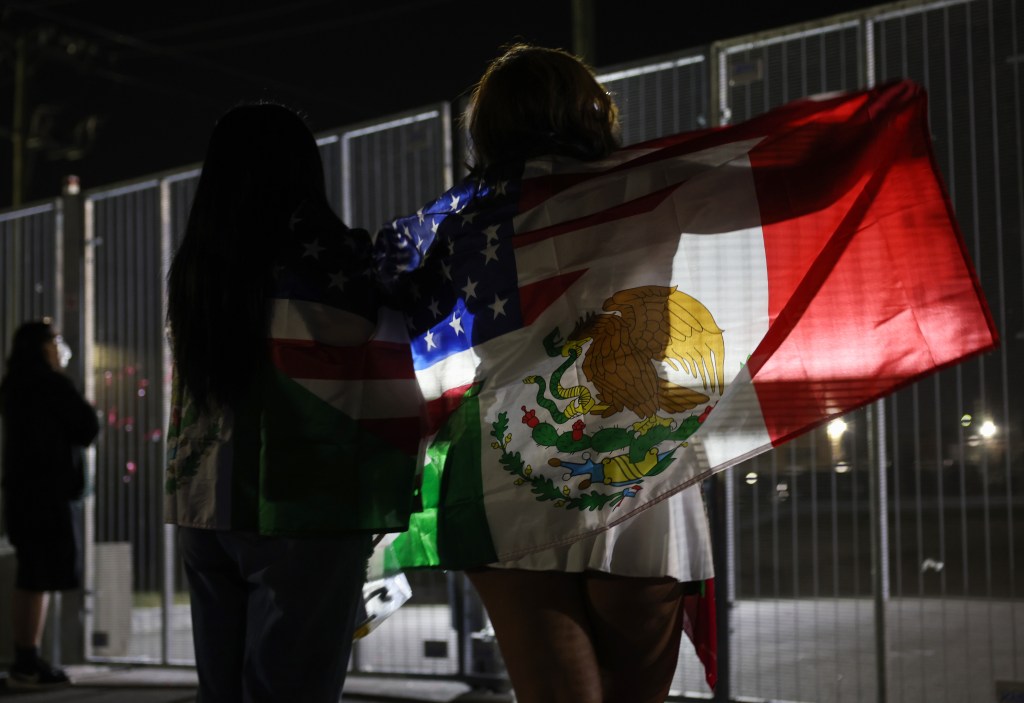A federal grand jury has refused to indict a Chicago couple arrested during a violent protest outside the U.S. Immigration and Customs Enforcement facility in Broadview last month, a rare move that prompted prosecutors to abruptly drop the case and signals government overreach in bringing the charges in the first place.
After the charges were officially dropped in court Wednesday morning, Richard Kling, the attorney for one of the defendants, called the grand jury’s rejection of the case an “extraordinary happenstance,” especially in Chicago’s federal court.
“I think the grand jurors in the Northern District (of Illinois) stood up for the First Amendment right to protest, and also reject gestapo-like troops on the streets of Chicago and neighboring communities,” Kling said.
Ray Collins, 21, and Jocelyne Robledo, 30, a husband and wife from the South Side of Chicago, were each allegedly carrying loaded guns with them as they scuffled with officers who were trying to widen a security perimeter during a melee in late September.
Both have lawful permits to carry the firearms, but they were facing felony charges of assaulting or resisting a federal officer in performance of official duties, which carries up to 8 years in prison.
Their case had been set Wednesday for a preliminary hearing, which rarely goes forward because the U.S. attorney’s office typically seeks an indictment from a grand jury.
Instead, prosecutors abruptly filed a motion Wednesday to dismiss the case. In court Wednesday, Assistant U.S. Attorney Brian Havey told U.S. Magistrate Judge Gabriel Fuentes, “Yesterday the government presented a category of charges to the grand jury … a no-bill was returned.”
Fuentes asked Havey, “When was the last time this happened in this district?”
“It happens periodically, judge,” Havey replied, adding that he doesn’t know offhand how often.
Kling, who represents Collins, told reporters after the hearing that in his decades defending criminal cases here, this was the first time a grand jury has refused to indict his client.
“The old adage is that a prosecutor could bring an indictment against a ham sandwich,” said Kling, of the Chicago-Kent School of Law. “Apparently they had less evidence than a ham sandwich.”
A U.S. attorney’s office spokesperson was not immediately available for comment.
Although Havey said the charges were being dismissed “without prejudice,” meaning prosecutors could seek to refile the case within 30 days, Kling said he highly doubted that would happen, noting the standard to get an indictment was very low.
“If they couldn’t get a grand jury to indict, how are they going to prove the case beyond a reasonable doubt to a jury?” he asked.
Both Collins and Robledo declined to comment as they left the Dirksen U.S. Courthouse.
The charges stemmed from an incident on Sept. 29 outside the facility in Broadview that saw agents deploy tear gas and other weapons on protesters. Federal officials said that a total of 11 people were taken into custody that day, including a journalist.
Prosecutors on Wednesday also dropped misdemeanor charges against another defendant arrested that day. Hubert Mazur, 21, of Medinah, was accused of fighting with officers who were trying to push the crowd back, according to a criminal complaint filed against him. The U.S. attorney’s office said additional video footage of Mazur’s encounter with officers prompted them to reconsider and drop the case.
Protesters have held near-daily demonstrations at the ICE facility since the U.S. Department of Homeland Security announced earlier this month it was launching “Operation Midway Blitz” to ramp up enforcement actions targeting immigrants lacking permanent legal status.
Federal agents have fired tear gas and baton rounds at protesters, continuing a trend of events that have become increasingly physical between officials and demonstrators. The charges also came a day after ICE and Border Patrol agents made a show of force downtown.
After the arrests, Havey called the charges against Collins and Robledo very serious and sought to have Collins held without bond pending trial, arguing he was a danger to the community for bringing a “loaded pistol to a volatile situation.”
“We are seeing now with these ongoing ICE operations very disturbing and aggressive protests,” Havey said at the time.
Kling said during the bond hearing his client lives in the Englewood neighborhood and carries his gun for protection. He has a firearm owner’s identification card and concealed carry license and never leaves home without it, Kling said, but there was no evidence he ever brandished it or intended to use it during the protest.
Fuentes said it was a “very close call,” but he had ordered Collins held pending trial, saying he showed extremely poor judgment bringing a loaded gun to an ICE protest where tensions were high.
Fuentes noted there has been “a tendency for ICE to be very aggressive” in enforcing the law and managing these protests, and that it was “not a surprise that there was a confrontation” in Broadview that night.
The judge noted even if Collins had not intended to use his gun, it could have led to disaster. “Other people could have been hurt,” he said.
Collins spent several days in jail before a district judge reversed Fuentes’ decision and allowed Collins to go free on bond.
Kling said Wednesday his client was “scared out of his mind” over the ordeal and “he’s still scared” despite having the case dismissed.
“My advice to him, quite frankly, was not to talk to you folks because I don’t want a bull’s-eye on his back,” Kling said.
Kling also said he believes the orders to bring the hammer against Collins and Robledo came not from prosecutors in Chicago, but their bosses.
“I think the charges came from Washington. Straight from Washington, from Attorney General (Pam) Bondi,” Kling said.
Originally Published: October 8, 2025 at 9:31 AM CDT
